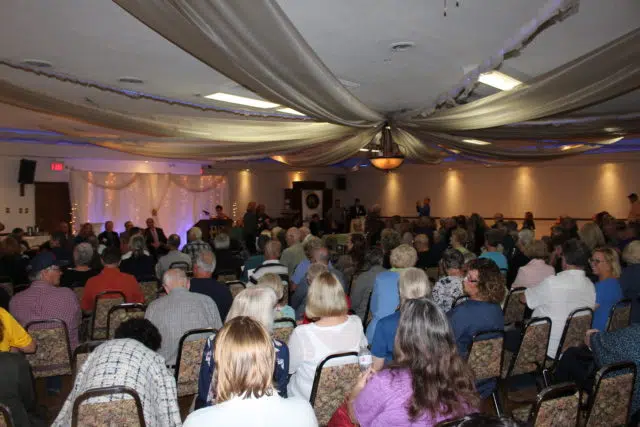One half of the 16 candidates vying for six spots in Ward 1 on Belleville city council. (Photo: Brock Ormond/Quinte News)
The 16 people vying for the six council spots in Belleville Ward 1 got their night in the spotlight on Wednesday.
The Belleville Chamber of Commerce hosted a Meet-and-Greet event at the Banquet Centre to allow members of the public to see and hear a bit about what incumbent and new candidates for council are planning to do to improve and revitalize the urban area of the city.
Through a discussion moderated by Chamber Vice-President Greg Sudds, each candidate was allowed to explain to the audience who they are and what thoughts and ideas they are bringing to the table. They were also given a chance to answer one question each pertaining to a pressing issue that is affecting Belleville today.
The main topics of discussion included; how to address the housing shortage and ways to develop affordable housing, how to acquire more tradespeople and ideas on how to keep young citizens in the area to stay.
Here’s a recap of the questions and answers from Wednesday night.
“We have a housing shortage in Belleville and this means first time home buyers and renters are facing difficulty in finding accommodations. What tools does the city have to assist with planning and developing new housing?”
The biggest issue brought up during the discussion was the lack of affordable housing, and multiple candidates said that major steps needed to be taken to address it.
One of two incumbent councillors from Ward 1, Kelly McCaw, says she will advocate for zoning changes to help single-family homes and lessen restrictions, creating a situation where some homes can be turned into a duplex or triplex, depending on frontages. McCaw mentioned the Facade Improvement Program, which allows owners or tenants of downtown buildings to receive a dollar-for-dollar grant match-up to a maximum amount – if the owners decide they want to invest in their own building, city council will help with that. If they can use that model to help owners restore facades to fit a certain design, it will go a long way to allowing the city to have new, revitalized housing for the future.
Former Belleville councillor Pat Culhane echoed McCaw’s statements regarding zoning changes, saying that many buildings in the city have available spaces that are going unused by owners. Culhane says she believes the city can work with those people to possibly add to the housing stock. Culhane gave a real-life example from the perspective of a citizen in need of housing with only so much money. She said a triplex had been sold on the street behind her and the man that was moving told her that he had found equivalent housing in a nice neighbourhood that was $700 more a month. Combined with food and rent, Culhane said that put him way over the 30% of income allocated for housing.
Culhane concluded by saying, “we need to recognize how difficult it is for some people and we need to look at innovative solutions and we need to work together as a community to put our hands out to help as many people as we can.”
Other councillors, including Stanley Jones, Carol Feeney and Sean Kelly among others, also mentioned the need to address the housing crisis in Belleville.
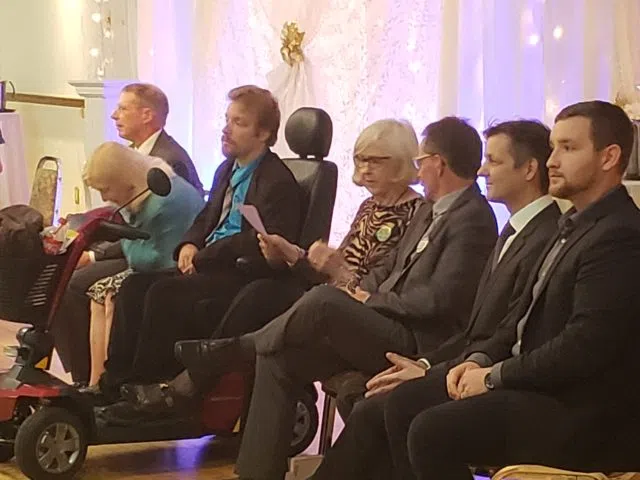
Another set of councillors vying for one of six spots in Ward 1 on Belleville Council. (Photo: Brock Ormond/Quinte News)
“What makes you proud to live in Belleville and what do you think we need to create (if we don’t have it now) in order to encourage people to live here?”
Chair and founder of Quintevation Ryan Williams said producing jobs and creating activities for citizens, especially the youth in the city, cannot be understated and is essential to keeping them living and thriving in Belleville. Williams said the focus should be on developing entrepreneurs to create “10 to 20 jobs” for younger members of the population and make Belleville a leader in rural development. He suggested that connecting Meyers Pier, Victoria Park and Zwick’s Park with a boardwalk would allow for people to participate in activities such as biking and kayaking to create an “urban centre” of sorts. Williams finished by saying “80 percent of youth that live in rural areas go to urban centres” like Toronto and said that his proposed ideas were all about creating a vibrant community that young people will want to stay in for the rest of their lives.
Jeremy T. Davis said that building businesses and the local economy is important in order to attract people in the community, but reminded the crowd that the people were equally as important in making Belleville thrive. He noted that the city and the Bay of Quinte region as a whole is a great tourist destination, but that being able to create a variety of different festivals and cultural events to showcase young, talented individuals in music and the arts will go a long way in growing the region’s population and attracting visitors to our area.
Stanley Jones said that Belleville “has a lot to offer” with regards to arts and culture, mentioning that the Rotary Club and the Hastings County Historical Society hold events every month for citizens. However, a great number of people, especially the younger citizens coming in from Loyalist College, don’t know when certain events are happening or if they’re even happening at all. Jones said getting people engaged with their community to inform them of what is going on is essential and that can be done through interactive communication.
“Doctor recruitment has been seen as successful endeavour, but we need skilled tradespeople as well. Can you extend resources to help businesses attract these people”
Much like what they have done in the past, Belleville needs to be closely tied with other municipalities, said Paul Martin. He said the Doctor Recruitment program has been a “cornerstone” of our area and says he believes bringing in skilled tradespeople can develop into that as well. Martin added they need to support and work with Loyalist College to offer apprenticeships and promote the ability for people to have careers in the trades. He said resources and investments need to be used effectively in order to maximize benefits throughout the city. Using existing relationships with municipalities like Quinte West, Prince Edward County, Deseronto, etc. and organizations like the Quinte Economic Development Commission will be essential in making Belleville a place for tradespeople to live and work.
Chris Malette agreed with Martin’s statements, adding the city’s role in providing funding for skilled tradespeople is very limited and should be improved all the way from Belleville through to Queen’s Park in Toronto. Getting creative is key to expanding improvements on that front.
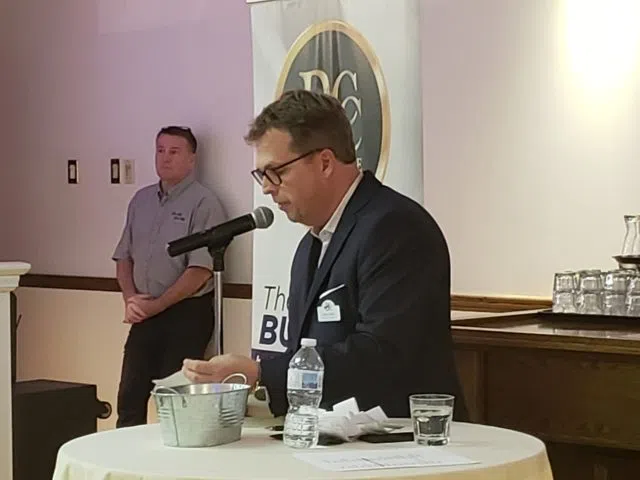
Belleville Chamber of Commerce 2nd Vice-President Greg Sudds was the moderator of the meeting on Wednesday night. (Photo: Brock Ormond/Quinte News)
“It is a function of the community to welcome international students as a way to increase population. Do you have any ideas of what might be an effective way to reach out to those people”
Having a sensible policy in bringing young people from outside Belleville and the country is important, said Paul Bell. He told the crowd that starts with getting back to the fundamentals and coming together to build infrastructure, and create employment in order to build wealth for them so they are able to be a contributor to the community.
Tyler Allsopp added that there are a lot of challenges to deal with for international students at Loyalist College. He said the new council will have to work closely with the Inclusivity Committee to market the different functions and programs available to help these students make an impact on the community. Allsopp added new developments and jobs will come from international students.
“The more we can do to help them integrate into our community, to make them feel at home here, to make them feel like they can build a future here, the better we’re going to be long-term,” Allsopp said.
“If I had a problem with a speed limit around my house, a pothole or burned out traffic light, how would you be able to help me?”
Danny Morrison said despite people being able to send in a concern or question online in this day and age, a lot of citizens still want to have their elected officials be there for them in person. Morrison said for example, if someone comes to him with an issue regarding a pothole in front of their house, he would call public works to have them come and fix it. Another example is, if someone is driving well over the speed limit in a school zone (like on MacDonald Avenue), he will take that complaint in writing to the Traffic Advisory Council.
Carol Feeney said in talking with people throughout the city while knocking on doors, the general consensus is that communication is vital to being able to solve problems and work together to make the community a better place in which to live and commute.
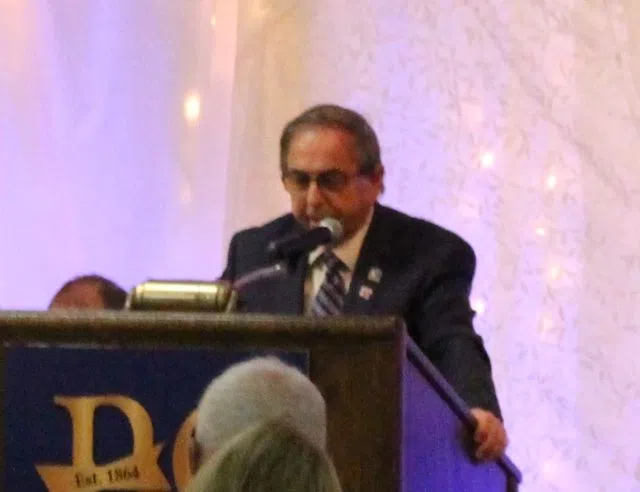
One of two incumbent councillors in Belleville Ward 1, Garnet Thompson, spoke about the need to evolve and create ways to better communicate with the public at a councillor meet and greet event Wednesday night. (Photo: Brock Ormond/Quinte News)
“Are you aware of the process the city currently uses to get public feedback on planning changes? Is it effective?”
A second incumbent councillor, Garnet Thompson, said the current system consists of a notice sent in the mail 20 days before a public meeting to address planning changes. He said there are other avenues to get them out to residents in a timely manner. These include utilizing the Chamber of Commerce’s weekly newsletter, as well as the city’s quarterly magazine and expanding the city’s website. Thompson says he feels they get the notices out as quickly as they can in busy times, but he also understands the need for different ways to inform the public in the modern age.
Brigitte Frances Muir said needs vary from person to person and that council can’t make everybody happy all the time. Muir said being able to actually talk to the citizens and listen to their complaints will be a large boost to improving overall community engagement.
“Customer service at City Hall comes up in business and retention surveys in each year, how must you approach this problem?”
Communication is the key word from Richard Black. Alluding to previous comments made about people still needing a personal touch from their elected officials even in this online age. “We need to be a full-time councillor…we need to be available 24 hours and definitely five days a week,” Black said. He mentioned an example about how he had to go back to City Hall six times while building his house, in search of whether or not he should have a permit, but didn’t get a definitive answer. Black says council needs to make citizens the first priority.
Sean Kelly told a story about the concerns that the president of the Bus Drivers Association had in terms of the deterioration of the bus terminal in downtown Belleville. The biggest complaint was that nobody is employed there anymore and that people are allowed to do whatever they please due to there being no guidance. In listening to the concerns, Kelly said that if he were on council, he would go about ways to get the rest of council and the mayor to help put people in to man the place. The smooth, daily operation of city buses is important to the vitality of local transit and the sooner members of council can communicate to address this issue, the better things will be.
Other issues that councillors said will need to be addressed in the next four years include; fixing roads, affordable healthcare, creating flexible marijuana laws, adjusting local transit and much more.
The election goes Monday, October 22.
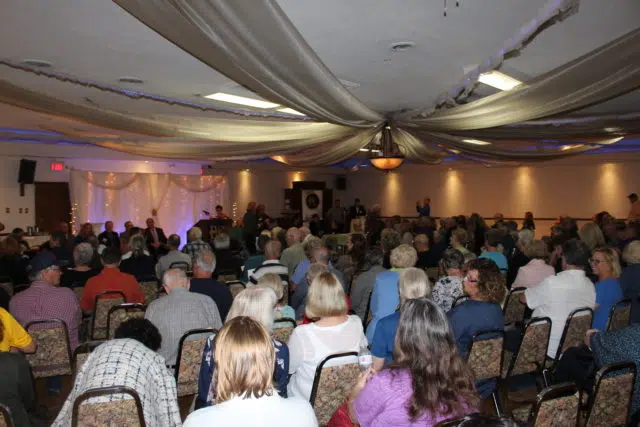
A large crowd took in the Belleville Councillors Ward 1 Meet and Greet Wednesday night at the Banquet Centre. (Photo: Brock Ormond/Quinte News)





